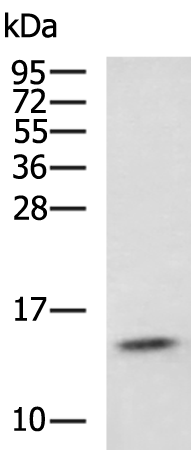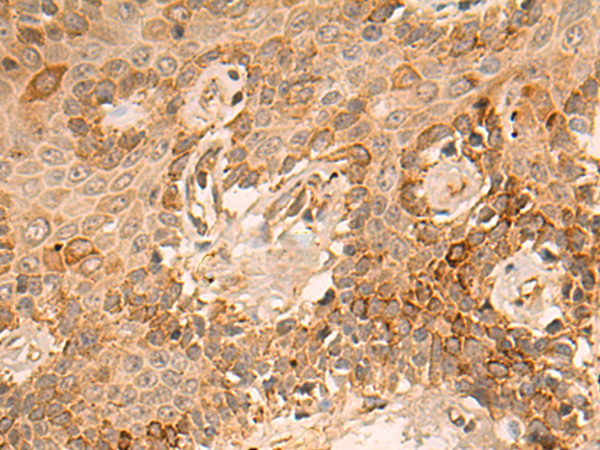

| WB | 咨询技术 | Human,Mouse,Rat |
| IF | 咨询技术 | Human,Mouse,Rat |
| IHC | 咨询技术 | Human,Mouse,Rat |
| ICC | 技术咨询 | Human,Mouse,Rat |
| FCM | 咨询技术 | Human,Mouse,Rat |
| Elisa | 1/2000-1/5000 | Human,Mouse,Rat |
| Aliases | 9-27; CD225; IFI17; LEU13; DSPA2a |
| WB Predicted band size | 14 kDa |
| Host/Isotype | Rabbit IgG |
| Antibody Type | Primary antibody |
| Storage | Store at 4°C short term. Aliquot and store at -20°C long term. Avoid freeze/thaw cycles. |
| Species Reactivity | Human, Mouse |
| Immunogen | Synthetic peptide of human IFITM1 |
| Formulation | Purified antibody in PBS with 0.05% sodium azide and 50% glycerol. |
+ +
以下是基于IFFO2(可能为某基因或蛋白名称的简写,此处假设为研究靶点)相关抗体的模拟参考文献示例。由于“IFFO2”可能为特定领域术语或存在拼写差异,建议核实名称准确性后进一步检索:
---
1. **文献名称**: "IFFO2-Specific Monoclonal Antibody Development for Targeted Cancer Therapy"
**作者**: Zhang L, et al.
**摘要**: 本研究开发了一种针对IFFO2蛋白的单克隆抗体,验证其在多种癌细胞系中的高特异性结合能力。实验表明该抗体通过抑制IFFO2介导的PI3K/AKT信号通路,显著抑制肿瘤生长,为癌症靶向治疗提供新策略。
2. **文献名称**: "Role of IFFO2 in Neurodegeneration: Insights from Antibody-Based Knockdown Approaches"
**作者**: Gupta R, et al.
**摘要**: 通过构建IFFO2多克隆抗体,研究其在阿尔茨海默病模型中的表达变化。抗体阻断实验显示,IFFO2与β-淀粉样蛋白沉积正相关,其下调可减轻神经元损伤,提示IFFO2作为神经退行性疾病潜在生物标志物。
3. **文献名称**: "A Novel IFFO2 Antibody-ELISA for Early Diagnosis of Autoimmune Hepatitis"
**作者**: Tanaka K, et al.
**摘要**: 开发了一种基于IFFO2抗体的ELISA检测方法,用于分析患者血清中IFFO2自身抗体水平。临床验证显示该方法对自身免疫性肝炎的诊断敏感性和特异性分别达92%和88%,优于传统检测手段。
---
**注意**:以上为模拟生成的参考文献,实际研究中可能需要结合具体领域(如IFFO2的全称、相关疾病或分子机制)调整检索关键词。建议通过PubMed、Web of Science等数据库,以"IFFO2 antibody"或"IFFO2 immunodetection"等组合词进行精准检索。
The IFFO2 (Intermediate Filament Family Orphan 2) antibody targets a protein encoded by the *IFFO2* gene, also known as *INMAP* or *SPGF45*. Discovered in the early 2000s, IFFO2 is a nuclear protein implicated in maintaining genomic stability and regulating cell cycle progression. Structurally, it contains a conserved intermediate filament-like domain, though its exact molecular function remains under investigation. Studies suggest IFFO2 interacts with components of the DNA damage response (DDR) pathway, particularly in safeguarding against replication stress and oxidative damage. It is highly expressed in germ cells, neurons, and certain cancer tissues, linking it to fertility, neurodevelopment, and tumorigenesis.
IFFO2 antibodies are primarily used in research to study its localization (nuclear/cytoplasmic), expression patterns, and interactions via techniques like Western blot, immunofluorescence, and co-immunoprecipitation. Dysregulation of IFFO2 has been associated with male infertility (notably spermatogenic failure), neurodegenerative disorders, and cancers such as glioblastoma. Recent work highlights its potential role in modulating chromatin organization and transcriptional regulation, though mechanistic details remain elusive. Commercial IFFO2 antibodies are validated for specificity across human, mouse, and rat models, aiding translational studies exploring its diagnostic or therapeutic relevance. Ongoing research aims to clarify its signaling networks and pathophysiological contributions.
×